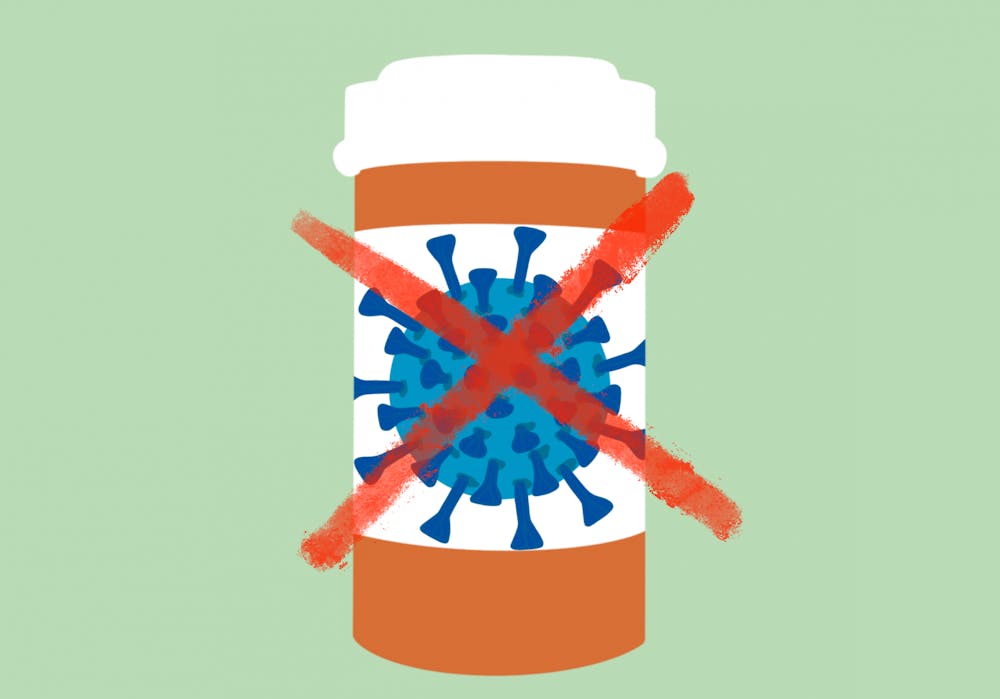U.Va. Health has joined a nationwide study looking to evaluate the effectiveness of two repurposed therapeutics to treat mild-to-moderate COVID-19. Repurposing these medications is helpful because they are already approved by the U.S. Food and Drug Administration, meaning they can be put into use right away, should the study prove effective.
The ACTIV-6 study is a nationwide double-blind study expected to enroll nearly 15,000 participants from across the country. Volunteers can participate remotely and must be 30 years of age or older, have tested positive for COVID-19 in the last 10 days and have had at least two symptoms for seven days or fewer.
Dr. Patrick E.H. Jackson, principal investigator for the clinical trial at U.Va. Health, has been involved with COVID-19 research since the first patients rolled through the hospital’s doors March 21 2020. They initially focused on hospital-based therapies as a part of the Adaptive COVID-19 Treatment Trial.
“As things kind of have stabilized, I think it's become quite clear that we need better therapies for our [COVID-19] patients, so we started looking around for other clinical trials we could be involved in,” Jackson said.
This was especially pertinent for patients suffering from mild symptoms, as the only therapies currently available for out-patients are oral antiviral pills such as Paxlovid and IV monoclonal antibody treatment such as Sotrovimab, both of which can be hard to access worldwide.
Jackson and his team joined the ACTIV-6 trials, which are being run out of Duke Clinical Research Institute and are NIH-sponsored. The goal of the ACTIV-6 trial is to look at drugs that have already been FDA approved for other purposes and to see if they have a benefit for patients with COVID-19.
“I think the hope is that if we find a hit here, you can have something that's cheap, widely available globally and could really make a big difference for people,” Jackson said.
The study is currently investigating the efficacy of Fluvoxamine and Ivermectin. Fluvoxamine is a selective reuptake inhibitor used to treat depression and was discovered as a possible COVID-19 treatment by neuroscience researcher Alban Gaultier and former graduate student Dorian Rosen. Ivermectin is currently used to treat parasitic infections.
“I think the big advantages are that because [Ivermectin and Fluvoxamine] are already FDA approved, we understand a lot about their side effect profiles and what patients they can be used on safely,” Jackson said. “Also the drugs that we're looking at are well stocked in pharmacies worldwide.”
The researchers hope to follow patients remotely for about three months to see how quickly patients recover from their symptoms, while also monitoring for symptoms of and responses to long-COVID-19, which can persist months to years after infection and is still not well understood.
“Using these drugs kind of upfront early might help to decrease some of these kinds of lingering symptoms that people experience,” Jackson said.
The researchers are focusing on the mild symptom population that's not as high risk as some in other clinical trials and have also included patients that have been vaccinated. This is an important part of the study because the current treatments like Paxlovid and Sotrovimab have only been studied in unvaccinated adults and those at high risk. Which means they predict lower rates of hospitalization and death in their study and will be focusing mostly on symptom resolution.
Participants in the study can still take Paxlovid and Sotrovimab, as they have been authorizedby a doctor, but the current authorization along with limited drug supply and logistical constraints limits use for only high risk patients, leaving out a large portion of people affected by COVID-19.
Heather Haughey, the clinical research manager assigned to the study, manages the team’s research portfolio, helping to bring clinical trials up, conduct them and close them out.
“Currently, there are no medications that can be given to patients at standard risk to accelerate symptom improvement,” Haughey wrote. “ACTIV6 could potentially find a drug that fills that role and might also be helpful for high risk groups, potentially in combination with Paxlovid or Sotrovimab.”
Unfortunately, Ivermectin, one of the drugs that is part of the ACTIV-6 study, has come under some political controversy and some doubt its effectiveness. Some lab studies have shown that Ivermectin is effective at stopping viral replication in cells when used at very high doses, however that does not mean it translates to an effective drug that can be used for patients.
“The Ivermectin literature is kind of a mess,” Haughey wrote. “There are some low quality studies that purport to show benefit for patients, higher quality studies that tend not to show benefit and some studies that are frankly fraudulent.”
The researchers hope to provide a more clear standard for the drug that decisively answers this question using transparent high quality data.
“I think that if we find benefits for Ivermectin that will change people's mind,” Jackson said. “And if we learn that Ivermectin doesn't have a benefit, I hope that we've been rigorous enough that this will answer the question for people and we can move on to look at more promising evidence.”
Overall, the study hopes to find more treatments for COVID-19 that can help people feel better faster and avoid the most severe consequences of the disease.
“The best drugs would be those that can be used for a broader swath of patients, are globally accessible and are durable to future viral variants,” Haughey wrote.







